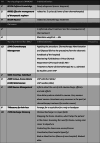How is individualized nursing care documented in nursing records of cancer patients: A qualitative content analysis
- PMID: 40405174
- PMCID: PMC12100984
- DOI: 10.1186/s12912-025-03230-6
How is individualized nursing care documented in nursing records of cancer patients: A qualitative content analysis
Abstract
Background: The nursing record is essential for displaying the content and results of nursing care for persons with severe and advanced cancer in treatment and palliative cancer wards. The nursing care plan (NCP), which uses standardized terminology, organizes the nursing record. Individualization of the standards is necessary to promote person-centered care.
Aim: To explore how individualized care is documented in the nursing records of persons and their families in treatment and palliative cancer care.
Method: Nursing records containing NCPs and progress notes for 29 inpatients from cancer treatment and palliative wards in three hospitals in Norway were explored utilizing qualitative content analysis.
Results: The NCPs elicited a limited image of the patients' situations and care needs, mainly conveyed through standardized terminology. The progress notes appeared as the leading source of information about the patients. Three main themes emerged from the analysis: (1) unutilized opportunities for individualized documentation in the NCPs, (2) incongruence between the NCPs and the progress notes, and (3) progress notes-an alternative route for documenting individualized care.
Conclusions: The study showed severe limitations in terms of the use and individualization of the NCP in the electronic health record (EHR). These limitations could be related to the cumbersome functionality of the EHR and the fact that the NCP targets efficiency and data availability purposes beyond being a tool for nursing care planning. The relational and dynamic aspects of nursing care were thinly captured, especially when documenting in a standardized format. EHR systems should be adapted to today's technology to a greater extent and adjusted to the individual patient's needs and experiences in cooperation with nurses as end users.
Clinical trial number: Not applicable.
Keywords: Cancer care; Content analysis; Individualized care; Nursing care plans; Nursing records; Palliative care; Person-centered care.
© 2025. The Author(s).
Conflict of interest statement
Declarations. Ethics approval and consent to participate: This study adheres to the Declaration of Helsinki. Ethical approval was obtained from the Norwegian Regional Ethical Committee (REK)(ref. no. 504500) and the Norwegian Agency for Shared Services in Education and Research (ref. no. 612395). Need for consent for participation was waived by REK (ref. no. 504500), due to inclusion of records only from patients who were deceased. The study includes no experiments on humans. The use of data was performed in accordance with relevant guidelines and regulations. Human ethics and consent to participate: Not applicable. Consent for publication: Not applicable. Competing interests: The authors declare no competing interests.
Figures




References
-
- Standard International. ISO 18104:2023 health informatics, categorial structures for representation of nursing practice in terminological systems. Standard Norge; 2023.
-
- Gulanick M, Myers JL. Nursing care plans: diagnoses, interventions, and outcomes. 9th ed. St. Louis, Missouri: Mosby Elsevier; 2017.
-
- Meleis AI. Theoretical nursing: development and progress. 6th ed. Philadelphia: Wolters Kluwer; 2018.
LinkOut - more resources
Full Text Sources

